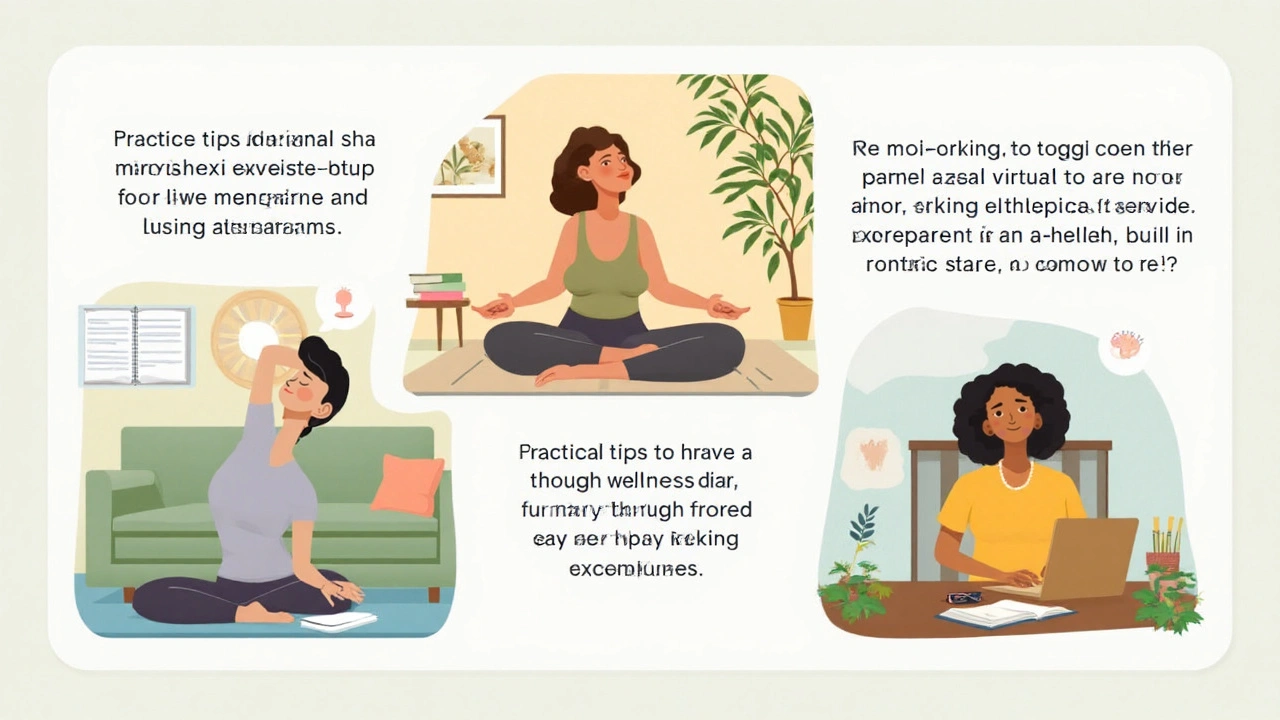Hot flashes in the middle of winter? Feeling like your body’s thermostat is broken, even while everyone else is bundled up in jumpers? You’re not the only one. For women dealing with breast cancer or at-risk for it, menopause can come roaring in when you start taking a drug like exemestane. But that’s just the start. There’s a whole world of small details that can make the difference between just getting through it and actually understanding what’s going on with your body.
What Exemestane Actually Does To Your Body
Exemestane isn’t your everyday tablet. Doctors call it an aromatase inhibitor, which sounds technical, but here’s what’s going on: it blocks an enzyme (aromatase) your body uses to make estrogen. Estrogen’s the hormone that keeps your bones, skin, mood, and a dozen other things running smoothly. Exemestane’s job is to lower estrogen levels, starving some types of breast cancer that feed on estrogen. But when you squeeze out almost all the estrogen, menopause symptoms can slap you in the face – even if you got through menopause years ago.
Why does exemestane push your body into a second, and sometimes rougher, menopause? After natural menopause, your ovaries stop making most of your estrogen, but your body still sneaks out tiny amounts from fat and muscle. Exemestane wipes out even that leftover trickle. Big changes follow: hot flashes, night sweats, mood swings, joint pain, and sometimes, a bone density crash. It’s not unusual for these to hit hard in the first few months. Some women say the hot flashes feel more intense than before, and sleep can get tricky.
The good news is that the body can adapt a bit over time. For many, the worst symptoms ease after three to six months. Still, some effects like joint aches or changed libido can linger. Studies say up to 80% of women on exemestane get hot flashes, about 40% notice stiffness or pain in their joints, and roughly 25% feel tired all the time. Sounds familiar?
| Common Exemestane Side Effects | Estimated Prevalence (%) |
|---|---|
| Hot flashes | 80 |
| Joint pain/stiffness | 42 |
| Fatigue | 25 |
| Bone loss | 11 |
| Mood swings | 15 |
| Night sweats | 60 |
| Decreased libido | 42 |
Now, you might be wondering: does it make sense to stick with this drug if it makes you feel miserable? Here’s the hard fact: for women with hormone-sensitive breast cancer, taking exemestane for five to ten years can cut the risk of recurrence by a third or more. That’s huge. The trade-off is clear, but tricky: better odds of beating cancer, but at the cost of daily nuisance or worse symptoms.

Tackling Symptoms: Real-World Tips That Work
No one wants advice that sounds like it was copy-pasted from a brochure. What really helps women slogging through exemestane? First, it pays to keep a symptoms diary. Not just for your doctor, but so you spot patterns: “Ah, I feel worse if I eat spicy food” or “Bad nights follow stressful days.” Tiny changes can add up.
Hot flashes are the big enemy. Some women find it helps to dress in layers even at home, use a fan by the bed, and avoid caffeine and alcohol, which both crank up flushes. If they don’t quit, your doctor might suggest non-hormonal meds like gabapentin or even certain antidepressants. And don’t laugh – cooling gel packs under the pillow can feel like magic at 2 a.m.
Joint pain caught lots of women off-guard. The thing most people don’t expect is how much walking or gentle exercise helps. A study from the University of Sydney tracked women on aromatase inhibitors and found just 30 minutes of brisk walking or water aerobics three times a week cut joint pain by nearly half. Swimming, cycling, and even yoga can build back the flexibility forfeited to stiff fingers or knees. Don’t skip strength exercises either—keeping those bones and muscles strong fights back against the bone-thinning that exemestane can bring.
Bone loss, by the way, is no joke. The data is clear: women taking exemestane lose bone density at a faster clip than women who don’t. An Australian clinical trial calculated the risk for osteoporosis jumps by about 20% after five years on the drug. That’s not inevitable though. Daily calcium (1200mg) and vitamin D (at least 800IU) should become your routine, unless your medical team tells you otherwise. Your doctor may schedule DEXA scans every couple of years to check your bones—don’t skip these.
Mood swings, irritability, and “menopause brain” happen to plenty of women—not because you’re weak or dramatic, but your brain is adjusting to nearly zero estrogen. Support groups online make a real difference; you’ll find women swapping practical tips, venting, and celebrating progress. If you feel down or anxious most of the time, that’s a good reason to check in with your GP. There’s no medal for suffering through it on your own.
Sex and intimacy can also take a hit. Vaginal dryness is a known offender. Reaching for lubricants or moisturizers isn’t shameful; it’s plain smart. Water-based products are safest, but your doc might OK certain estrogen-free or very low-dose estrogen products if dryness is severe enough to hurt. Open chat with your partner, and patience with yourself, help more than most people expect.
Here’s a simple checklist of daily strategies for handling exemestane’s challenges:
- Layer clothing—quickly cool down during hot flashes
- Avoid triggers like hot drinks, caffeine, spicy foods, and stress when possible
- Keep up daily calcium and vitamin D
- Exercise regularly—mix walking, stretching, and strength moves
- Stay hydrated (menopause dries you out!)
- Use lubricants for comfort during intimacy
- Track your symptoms and moods
- Reach out to support groups or friends
One technical but meaningful tip: take your exemestane at the same time each day, with food. This helps your body absorb it better, and it keeps side effects more predictable. A lot of women find night dosing lessens some of the daytime nuisances, but always check with your doc before changing the routine.

Sticking With Exemestane: When to Push Through, When to Talk to Your Doctor
Even with all these fixes, some women find exemestane brutal. It’s not a failure to struggle. Staying on the drug for the recommended five-plus years slashes the chance of cancer coming back, but at what cost? The conversation you have with your oncologist matters here. If your quality of life is taking a nosedive, don’t tough it out in silence. There are options.
Switching from exemestane to a different aromatase inhibitor like anastrozole or letrozole can make a big difference, and side effects aren’t always the same for every drug. Your doctor can also fine-tune symptom management: add meds for hot flashes, try bisphosphonates for your bones, or even adjust the dose if there’s a good reason. Sometimes it’s even possible to take a short “drug holiday”—a few weeks off—to let the worst symptoms settle down before restarting.
No two women experience this journey the same way. Age, stage of menopause, body weight, genetics, and even culture shape how symptoms show up. Studies from Canada found women with higher body fat felt worse joint pain, while a US cohort saw lighter women had more bone loss. So, stay alert to *your* body, not the averages.
If you’re worried about memory or “brain fog,” you’re in good company. One study in 2022, published in Breast Cancer Research, found about 30% of women on exemestane struggled with word-finding or forgetfulness. Crossword puzzles and memory apps can help, but if it feels like more than the occasional brain fade, flag it with your healthcare team. More research is underway on ways to lighten this particular load.
Routine bloodwork checks up on liver function and cholesterol, as exemestane can sometimes nudge up cholesterol levels. It’s rare, but keep an eye out for sudden swelling, breathlessness, or bruising—these could signal a rare side effect and you should see a doctor pronto.
One last myth to clear up: while hot flashes and night sweats are annoying, they’re not dangerous. But if you can’t sleep, if pain stops you from moving, or if you feel persistently low, that’s something to address, not just endure. Tell your medical team. Most want to know how you’re feeling, not just if your blood tests look normal on a screen.
The payoff—lower cancer risk—matters, but it shouldn’t mean sacrificing comfort, mobility, or happiness day to day. You know your body better than anyone. Don’t hesitate to speak up about side effects, seek out new tools, and tweak your strategies as needed. Exemestane is a powerful tool, but you’re still the one in charge of your life and your choices.

